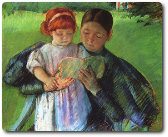Christina Rossetti, selected poems Contents
- Social / political context
- Religious / philosophical context
- Literary context
- A Better Resurrection
- A Birthday
- A Royal Princess
- At Home
- Cousin Kate
- Despised and Rejected
- Echo
- Goblin Market
- Good Friday
- Jessie Cameron
- L.E.L
- Maude Clare
- Remember
- Shut Out
- Song (When I am dead, my dearest)
- Summer is Ended
- The Convent Threshold
- The Lowest Place
- To Lalla, reading my verses topsy-turvy
- Twice
- Up-hill
- Winter: My Secret
'To Lalla, reading my verses topsy-turvy' - Synopsis and commentary
Synopsis
 The older cousin of a little girl, Lalla, comments on how bemusing text must be to someone who cannot yet read. When the speaker asks Lalla the book's meaning, she realises that although the child is uncomprehending, her ‘happy spirit' makes her confident and teaches her more important things than learning from books can.
The older cousin of a little girl, Lalla, comments on how bemusing text must be to someone who cannot yet read. When the speaker asks Lalla the book's meaning, she realises that although the child is uncomprehending, her ‘happy spirit' makes her confident and teaches her more important things than learning from books can.
Commentary
Rossetti composed To Lalla in 1849, but did not publish it during her lifetime. It was first printed in 1896 in a volume of her poetry edited by her brother, William Michael. Entitled New Poems, Hitherto Unpublished and Uncollected, this volume contained poetry that Rossetti wrote for particular people or occasions.
Who was Lalla?
Lalla was the pet name of Rossetti's cousin, Henrietta Polydore. By using this name in the title of her poem, Rossetti immediately creates an informal and compassionate tone. This becomes more apparent given that the poem was written when Henrietta was around three years old.
Henrietta died in 1874 when she was about twenty-eight. Throughout her lifetime, Rossetti corresponded with her and dedicated several poems to her. One, entitled For H.P., which she wrote in 1859, asks that ‘Jesus keep both you and me' (line 2). It expresses her concern for her cousin who was, at the time, in Salt Lake City with the Mormons and about to return to England.
Wisdom
The poem ends with the thought, directed at Lalla, ‘You are much the wisest, / Though I know the most' (lines 31-2). The idea that wisdom is different to knowledge and comes not from reading many books or from absorbing the facts of science may appear surprising. Here, Rossetti presents wisdom as a form of innocence and a capacity for joy. She laments that this innocence, that gives rise to expressions of happiness, often disappears as individuals grow older.
Describing Lalla as ‘thoughtful', ‘solemn' and ‘asking' (lines 2, 13, 26), Rossetti dismantles the stereotype that young children are ignorant and incapable of deep thought. Although she may not yet be able to read and write, Rossetti suggests that Lalla is equal to any adult in thoughtfulness and wisdom, if not more so.
Investigating To Lalla, reading my verses topsy-turvy
- Describe your initial reaction to this poem
- Does the poem surprise you?
- How does To Lalla differ to some of Rossetti's other poems?
- Look particularly at Winter: My Secret.
- How would you describe Rossetti's attitude towards children?
- What do you associate with the idea of wisdom?
- How are these associations met in To Lalla?
